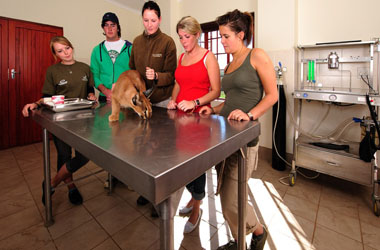The UCAS deadlines are looming for those of you looking to apply to veterinary school, and many of you are no doubt looking over your personal statements wondering how to make it stronger. The competition for a place at vet school is fierce, with only a little more than a thousand places estimated to be available to applicants in 2015. With that in mind, it’s important to think about what you could be doing to make your application stand out from the crowd.
If you’re about to apply to university, you should already have the necessary work experience, as universities are unlikely to take future placements into account. But there’s absolutely no harm in continuing to take on work placements between now and starting uni, it’ll only make you better.
The universities offering veterinary courses are all very prestigious, and applicants are expected to achieve high grades, so you’re already competing with the cream of the crop. Some experience working in different veterinary sectors is required by most schools, but by making it as broad and interesting an experience as possible you can make your application stand out from the crowd. Having a varied and interesting list of experiences on your CV shows that you’re engaged with your career choice and makes your passion obvious. Pre vet courses can also be a very useful way to get a taste of what veterinary work is like if you’ve still not completely made up your mind. The worst thing you can do is start down that road and 3 years later realise you made the wrong choice!
Start Planning Early
Some universities actually specify that you have to have a certain amount of work experience before applying, and you should know these requirements before applying to avoid disappointment. For example, Liverpool asks that all applicants rack up at least six weeks of work experience in both veterinary and husbandry related sectors.
With this in mind, the sooner you start planning your veterinary work experience and looking into pre vet courses, the better. Not only does it give you more time to get everything sorted, it also gives you more variety, as different opportunities will be available at different times of year. Many vet students will tell you that they were doing work experience for a year or more before applying to university. It’s by no means required that you work that many hours, but it makes you stand out from your fellow applicants as someone who’s willing to go the extra mile and further themselves.
Get the Core Experiences First
When you’re arranging your animal care work experience, think about the core skills you’re going to need. Prioritise getting experience in key areas such as dairy farming, stables and re-homing centers before going for more exotic work experience. That’s not to say that they’re not useful, our own wildlife vet shadowing course is very popular with pre-vets looking to broaden their experience; but you should use these placements as the crowning glory to a strong base rather than the foundation.
What Should I Look to Get Out of My Experience?
Practical skills – First and foremost, you want to be learning as much as you can in the time you have. It will not only make you a more impressive applicant, it will also make you a better vet. It’s ok (and often required) to start out simply watching, but once you’ve been on a placement for a few weeks, look to get your hands dirty!
A reference point – We recommend keeping a diary whilst on work experience, that way you have physical documentation of what it is you’ve been doing on your placement, and also because it forces you to think about what you’ve learned every day and, as a result, helps you get the most out of your time.
A network – Any work placement is going to give you the chance to make contacts that may well be of use to your in the future. Either as part of your university education, or as a future work contact. Make sure to be friendly and helpful the whole time you’re on a course or placement, it makes you memorable and if you ask for a reference at the end you want to make sure you’ve put the best foot forward.
The good news for those of you just starting to think about your applications is there are plenty of opportunities out there for an enthusiastic students looking to train to be a vet. Email, call, talk to people in the know (farmer’s are good people to know!) and you should be able to find at least one person who can give you some time and then recommend you to another person. If you’re struggling to make that first contact, keep in mind there are also paid options available which you can use as a jump start. But really if you’re enthusiastic and show your passion for animals (and medicine, that’s just as important. If not more!) then you should be fine.
Good luck!


